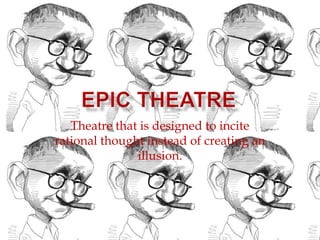
Theatre presentation
- 1. Epic Theatre Theatre that is designed to incite rational thought instead of creating an illusion.
- 2. Contributors Erwin Piscator: director and producer, came up with the name Bertolt Brecht: he was the one who perfected the style of epic theatre
- 3. The Alienation Effect The Alienation Effect was a major part of Epic Theatre The goal was to make sure that the audience was aware that they are watching a play the whole time, so every familiar thing that was in the play was done differently to make it look strange.
- 4. The Epic Play The Epic Play follows a familiar story like a fable or shows historical events Brecht wanted to make to play unsensational by taking away any attraction-grabbing ‘wrapping' that an original story may have The form is episodic The plays consists of scenes that stand alone There were musical interludes, captions, or gestures in between the scenes so the audience could reflect on what they just saw and prevent the deception of reality
- 5. The Epic Play (cont.) Brecht’s plays were able to stand alone. Brecht wanted to show the story from many different viewpoints. Brecht compared it to 10 people witnessing the same car crash because the story will be retold differently because each person saw it from a different angle The characters in the epic play represent humankind, so the audience will not have sympathy for them
- 6. The Epic Actor Epic actors are narrators and demonstrators. They retell events and demonstrate actions and events that assist in the audience’s understanding of the situation. Brecht wanted his actors to portray another’s emotions feelings and experiences. In order to do this Brecht used a technique called Gestus, which is a gesture or position that an actor would take at critical points of the play
- 7. The Epic Actor (cont.) The action in the play would stop and the audience will see the character’s feeling at that time The well known Gestus is in Mother Courage when Mother Courage looks at the audience with her face positioned in a silent scream
- 8. The Epic Stage Brecht thought that the Epic Stage was a place for discussion A social or politically relevant topic was presented on stage and the opinion on that topic was presented. The audience is supposed to think about what they just saw by forming questions or solutions Brecht did not hide any of the theatrical elements that are used in the production
- 9. The Epic Stage (cont.) The audience saw changes in lighting, scenery, costumes, and acting style projections Brecht wanted to remind the audience that everything that they are watching is fake. Brecht wanted to change the scale of the props used and use them out of context. For example using a building as a prop in one scene, and in the next scene flipping the building over and using it as a table.
- 10. The Epic Audience The audience that Brecht wanted to appeal to was a relaxed audience, one that is interested, want to be entertained, and want to think.
- 11. Contrast Dramatic Theatre and Epic Theatre Dramatic Form of Theater Epic Form of Theater the stage embodies an event draws the spectator into an event consumes his capacity for action allows him to have emotions provides him with experience the spectator is drawn into the plot suggestion is used feelings are preserved man is assumed to be known man is unalterable suspense about the outcome one scene exists for another linear development the world as it is what man ought to do his instincts thinking determines being the stage narrates an event makes him an observer, but... awakens his capacity for action demands decisions from him provides him with knowledge the spectator is placed opposite the plot arguments are used feelings are propelled into perceptions man is the object of the inquiry man is alterable and altering suspense about the progress each scene exists for itself in curves the world as it becomes what man is forced to do his motivations social being determines thinking
- 12. Sources http://www.usq.edu.au/artsworx/schoolresources/goodwomanofszechwan/epictheatre.htm http://oregonstate.edu/instruct/ger342/brecht3.htm http://www.etsu.edu/haleyd/engl3134/ejournal/lackey.html http://oak.cats.ohiou.edu/~eh269403/moco.html http://www.youtube.com/watch?v=Oz1M0lEW9rc&feature=related
